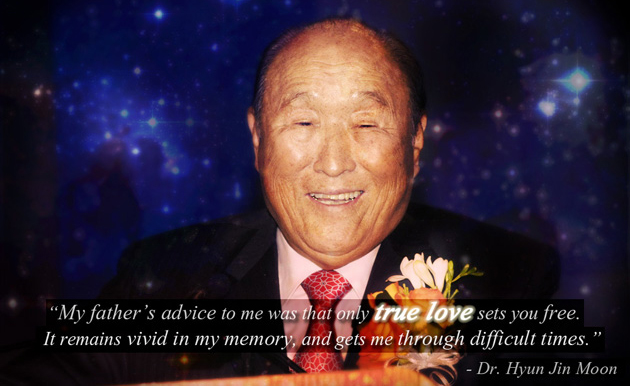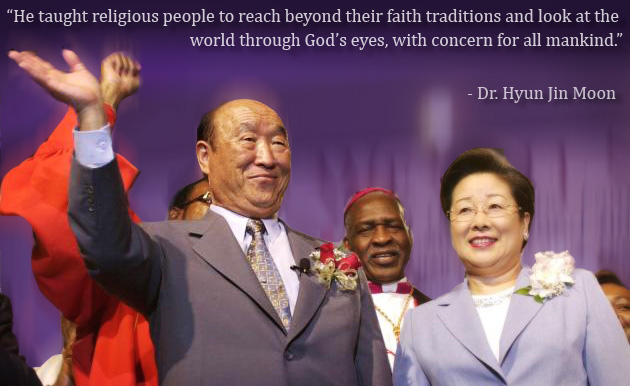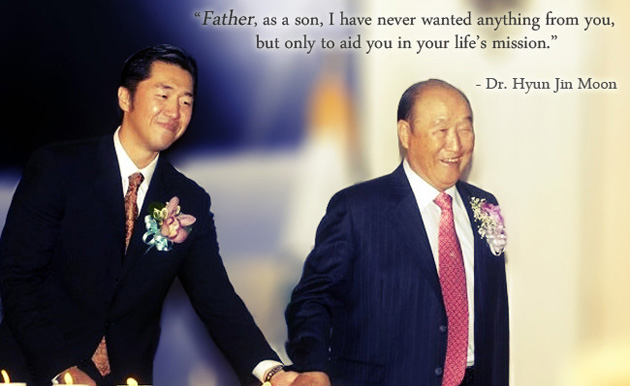“This is the time and hour for deep reflection, meditation, renewal and re-commitment. I pray that we stand as owners carrying
the mission with my father, to realize this dream of building one family under God.” ~Dr. Hyun Jin Moon
A Tribute to My Father
Legacy of Rev. Dr. Sun Myung Moon
Promise to Peace – The Journey Begins
Life Work
Universal Principles and Values
To My Father
A Tribute to My Father
My heart grieves as a son for the passing of my father, but I am comforted in knowing that his indomitable spirit and enduring legacy will live on in the memories of the countless people he has touched through his visionary ministry. He lived a remarkable life, and it is important for us to honor that life in the proper way.
My father was first and foremost a filial son to God, committing his entire life to the substantial realization of His will on earth. And by doing so, he sought to comfort God’s agonizing heart. His deep, personal relationship with God fueled his passionate desire to bring God’s blessing to all of His children, regardless of the pretensions — be they racial, ethnic, national, or even religious — that so often divide and alienate the human family.
He committed himself and his entire foundation to the providential mission of building a world of peace and reconciliation, centered upon the vision of One Family under God. His aspiration was for a global God-centered family rooted in universal principles and the value system of True Love, a selfless love manifested as “living for the sake of others.”
I know that his greatest desire was to set the precedent of devotion and service to that will and, thereby, inspire others to work with the same passionate commitment and sense of ownership to make God’s dream into a substantial reality. My father believed that this vision has been the yearning of mankind throughout our tumultuous history and, most of all, has been the dream of God ever since human creation. It is God’s dream, but my father took ownership of it and lived to fulfill it through his ministry and works.
Therefore, the most fitting tribute to my father is to create a living monument to the dream which inspired his life. His visionary and pioneering life is like a foundation stone upon which others must now build, continuing the efforts he began with the same passion, commitment and zeal. That is the best way, I believe, to honor his life and consecrate a fitting legacy to a life which has given so much.
As a son, who has taken to heart the meaning of my father’s life and teaching, I dedicate myself to continue this work together with all those who have been inspired by the vision of “One Family under God” and the ideals my father lived for.
Legacy of Rev. Dr. Sun Myung Moon
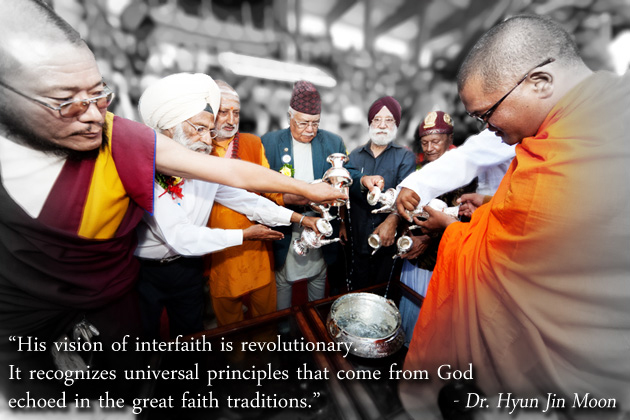
Rev. Dr. Sun Myung Moon is widely misrepresented and misunderstood as the founder of the Unification Church. However, his overarching purpose was never to establish a church.
His work began from a deeply personal promise that he made to God of “saving humanity from suffering and bringing joy to God.” (Moon, Sun Myung, Peace-Loving Global Citizen, p. 50) He poured his whole life into this mission. He remained steadfast to this promise, despite frequent and strong opposition.
From individual struggles with conscience, to conflicts between the family, society and world, he offered a comprehensive formula for peacemaking that centered on the principle of true love, living for the sake of others. He taught that every person, family and country should seek to live for a larger and higher purpose, and therein lay the key to peace and happiness.
He lived his life this way. He lived to love God and humanity. He embraced even those who could have been considered enemies.
From the beginnings of his work, Rev. Moon’s perspective was ecumenical. When he established his first organization, he consciously chose the name “Holy Spirit Association for the Unification of World Christianity”. It was not a church, but an association to bring together the branches Christianity to work towards the common goal of peace.
This tradition continued as the movement grew. Even when they had almost nothing, Rev. Moon dedicated funds to foster inter-religious, multi-sectored cooperation through dialogue and humanitarian work. This was not only to address the rift in his home country of Korea, but for division around the world.
To Rev. Moon, the goal of peace was more important than the organizations and institutions that he founded. He worked to reconnect all people with their conscience and to God, and to build bridges in a divided world. This explains why he founded numerous organization, each serving to generate dialogue and cooperation in specific niches to work towards peace, whether in religion, education, family, service, women’s issues, politics, human rights, oceanography or industry.
This explains why in 1996 he dissolved the Holy Spirit Association for the Unification of World Christianity, by then inaccurately called the Unification Church, to create the Family Federation for World Peace and Unification. And in 2005 he established the Universal Peace Federation which at its height, engaged thousands of peace-loving individuals to work to transcend the barriers of race, nationality, and religion.
These people gathered to build consensus on universally shared values and a vision of peace that came to be embodied in the phrase, “one family under God.”
Rev. Moon was a true advocate of peace. In his own words, “Religious people, whose mission is to lead humanity into the ideal world, must not forget for a moment that their only mission is to be apostles of peace.” (Moon, Sun Myung, As a Peace-Loving Global Citizen, 2009, p.290)This is his enduring legacy of service to God and humanity. And this is the work that Hyun Jin Moon, has promised to carry out in his life’s work.
Promise to Peace – The Journey Begins
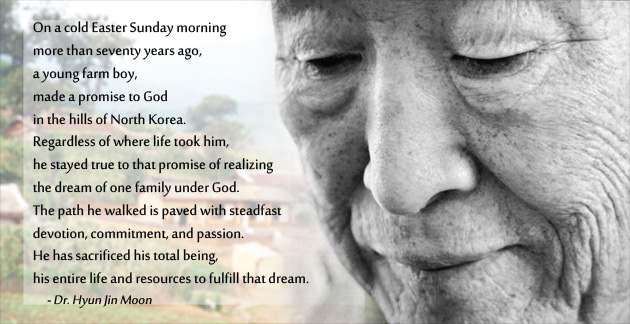
Rev. Dr. Sun Myung Moon’s journey for peace began with a promise he made to God on a cold Easter Sunday morning in the mountains of North Korea. Having seen his country torn by annexation and then war, during his teenage years Rev. Moon began questioning the cause of humanity’s suffering.
On Easter Sunday, after a night long prayer contemplating this very question, Rev. Moon writes, “I saw clearly the sorrowful face of Jesus. I heard his voice clearly.”(p.49) During that encounter, Rev. Moon made a commitment to find a path that would release humanity from its suffering and bring joy to God.
He began his work with uncertainty. “It was such a huge and tremendous responsibility. I shuddered in fear to think that I might not be able to handle it on my own.” (p.50) Yet, he remained steadfast to this promise that he made to God, to find a way to peace, gathering many kindred spirits who became like family, to join in his quest to fulfill this promise.
“I have dedicated my life to building bridges of peace between countries that hate each other as enemies because of ideology and religion…From the time I was old enough to know what was going on in the world, there has been only one objective for my life: that is for the world to live in peace, as one. I never wanted anything else.” (p. 4)
His life has been mostly misunderstood, not only by the public, but also by those who worked closest with him. Yet, as expressed above, he lived his life building bridges. He taught about the unity between the heart, mind and body of a person, the oneness between a husband and a wife, and the members of a family, the reconciliation between North and South Korea, and melting the enmity between Muslims, Christians and Jews. However, most fundamentally, he taught about bringing humanity back together with God.
Rev. Moon’s sole goal and purpose in life has been to heal the rifts that estranged the human family from each other and from their root, God. In his own words, “It has not been easy to live day and night for the purpose of peace, but that is the work that makes me most happy.” (p.4) He was happiest when working towards the resolution of enmity and the building of peace in the understanding that we are all one family under God.
Life Work
“To my father, the dream to build One Family Under God is not the dream of just one man, woman or family but belongs to all humanity and, most of all, belongs to God. It is that noble legacy that we seek to carry forward today.” ~Dr. Hyun Jin Moon
Universal Principles and Values
Rev. Dr. Sun Myung Moon taught universal truths in order to reestablish a relationship between God and humanity. He did not seek to construct a new theology for a new religion. Many of the central points of his teachings are present in most religions, footprints of God’s work to reconnect with humanity.
Rev. Moon searched for these principles through spiritual contemplation and experiences in nature. In his autobiography he wrote, “We can find peace in the air we breathe, in the natural environment and in the people around us.” (p.2). Simple but profound experiences of watching the seasons change, or fishing days on the ocean are the foundations of what he taught.
These principles are expounded in volumes of speeches, particularly a series entitled Peace Messages that were delivered from 2005-2007, and the Divine Principle. He explained God’s purpose for creating the universe, the principles that govern it, the root of humanity’s suffering, and God’s journey to rebuild His family.
At the heart of his teachings is the principle of true love: that every being was created to live for something beyond itself. He writes: “The truth of the universe is that we must acknowledge each other and help each other…for everyone to live together, for the sake of one another. Anyone who deviates from this principle faces certain ruin.” (p. 6) He explained that the root cause of the current state of humanity is a legacy of false love, instead of true love. The blessing and marriage movement was created as a means to re-establish a legacy of true love and build families centered on God.
He initiated many entities that promoted dialogue between religious leaders, scientific experts and civic leaders, building consensus on these universal principles and promoting models for peaceful families, societies and nations.
Family – The Foundation of Peace
Early in his life Rev. Moon noticed “the suffering of one family seemed connected to the suffering of the nation and of the world” (p.47).In his work for peace, family has always been central.
Rev. Moon taught that the family is the most fundamental unit where human relationships and character are forged. The first experiences of love, as a child, sibling, spouse or parent, occur in the family. The first place where ethics like responsibility and accountability for society, nation and God are learned is in the family. He writes, “[The family] is the school of love where people can learn how to love each other and live together in peace.” (p. 208)
This was the culture he instilled in his work and organizations. People who joined him in his work for peace were family. He initiated the inter-religious, intercultural marriage and blessing ceremony as the starting point of families linked to God’s ideal and committed to the ethic of true love, building a a movement of multicultural families that dissolves the barriers that divide humanity, one family at a time Moreover, in 1996 he replaced the HSA-UWC (Holy Spirit Association for the Unification of World Christianity) with the Family Federation for World Peace and Unification (FFWPU). During the FFWPU inaugural, he shared that he wanted to build an association of families that would transcend racial, national and religious boundaries to work for peace.
He taught that humanity is one family with a common parent, God. Families who place God at the center of their relationships and embodied the culture of true love are “the base camp for world peace,” (p. 208) To this end, he has worked to build families that live not just for the family, community and nation, but for God and all humanity. This vision has been encapsulated in the phrase, “one family under God.”
Peace Through True Love
Rev. Moon has taught that the key to peace is true love.
In his life, he experienced Korea’s annexation and persecution by a neighboring country, and later was imprisoned by his own countryman in a labor camp. He experienced his country and family torn in half by opposing ideologies, and saw people wracked with hunger and poverty. More recently he has been misunderstood and misrepresented. Yet, he never reacted with hate. He always began with the simple act of loving even those who wronged him.“Even enemies melt away without a trace in the presence of true love.”(p.9)
Rev. Moon taught that peace would come not through guns or war, but through true love, “a heart that gives and gives and wants to continuing giving, the act of living for the sake of others, even to the point of sacrificing oneself.” This is how he pursued peace.
His life from beginning to end has been a life of service towards humanity. In his early years, his family had a tradition to feed others, even when they didn’t have enough to feed themselves. He shared that the first thing he learned to do after walking was to serve food to others. While imprisoned in the North Korean labor camp, he survived by sharing half his bowl of barley with his fellow prisoners. Later in life, he spent months fishing in the Pantanal region fishing with locals to feed their children.
This tradition has carried over in his work. He sought not only to feed the hungry, but to provide industry by which they could sustain themselves. He invested in numerous humanitarian initiatives as well as ventures in the fish and machinery industries. Moreover, he encouraged others to work together to address humanity’s concern. Every initiative and organization he founded encouraged people, families, religions, nations, even politicians and academics to work beyond their differences for the sake of the world and peace.
This is his legacy of peace. “At times, the path of love was so difficult that my knees buckled under me, but even then I felt happy in my heart, dedicated to loving humanity.”(p.9)
Interfaith
From the outset of his work, Rev. Moon has sought to bring together people of faith to work in common cause. The first organization that he established was the Holy Spirit Association for the Unification of World Christianity. It was established to enable branches of Christianity to work beyond their theological differences for peace. Even when his association had nearly no funds, it spent more on ecumenical work than building itself.
In his autobiography he wrote, “Religions around the world must understand the destination of the human journey and immediately cease all major and minor struggles. They should not be fighting for the purpose of protecting their own honor. Religions must pool their wisdom and combine their energies and work diligently to build the ideal world.” (290)
As his work progressed, Rev. Dr. Moon expanded his inter-faith and intercultural work for peace to promote dialogue between scientific experts, academics from numerous fields of study, and religious leaders from faiths even beyond Christianity, including Islam, Judaism, Buddhism, and Hinduism.
His perspective on interfaith is simply, that God is beginning of humanity, and expressions of His truth are present in the teachings of all religions. People of faith have a common mission, beyond the unique doctrines of their particular tradition, to fulfill the dream of God, which is to bring humanity back together as one family.
North-South Reunification
One summer when Rev. Dr. Moon was a teenager, he took a pilgrimage around Korea. With no money in his pocket, he walked and hitchhiked to every corner his homeland. He was lodged and fed by generous countrymen. What he saw was, “a crucible of tears. There was no end to the sorrowful sighs of suffering from hungry people. Their woeful lamentations turned to tears that flowed like a river.” (p.10)
This situation would not get better. After the Japanese annexation ended, communism and democracy would face-off on the Korean Peninsula. At one point, Rev. Dr. Moon was imprisoned in a North Korean death camp by communist forces for teaching spiritual principles. He narrowly avoided death when UN Troops crossed into the northern front, liberating the prison camp that held him. The Korean War would eventually carve his nation into two. “We were forcibly separated from our loving parents and siblings.” (p.285) Rev. Moon’s birthplace is in the North. He experienced being torn from his hometown and family.
This suffering and division gave Rev. Moon insight into the situation of humanity and God’s heart. “The Korean peninsula is a scaled-down version of the world. If blood were shed on the Korean peninsula, it would be shed in the world. If reconciliation occurred on the peninsula, there would be reconciliation. If the peninsula were unified, this would bring about unification in the world.” (p.253)
Thus, he has invested in opening a path to peace and reconciliation on the Korean peninsula for the sake of the world. He taught Korea to invest not only in itself, but in the world. To this end he sent hundreds of people around the world, teaching others to build a peace movement centered on the principle of true love.
In 1991, Rev. Moon was able to return to the North for the first time since the Korean War. He met with Kim Il-Sung, the leader of North Korea. “The two of us simultaneously embraced each other. I was an anti-communist and he was the leader of a communist party, but ideology and philosophies were not important in the context of our meeting. We were like brothers who were meeting for the first time after a long separation. This was the power of belonging to the same people and sharing the same blood.” (p.259)
To the end, Rev. Moon has worked based on this principle, that all humanity is one family. He worked to breakdown the divisions of race, nationality and religion to bring humankind back together.
Memories with My Father
When I was a teenager, I remember fishing with my father on the cold Alaskan sea. While my father was focused on fishing with other people at the stern of a small boat, I was fishing at the front of the boat and fell into the sea.The water temperature of the Alaskan sea is so cold that most people die from a heart attack after about 15 minutes in the water. Nobody noticed that I had fallen overboard. I tied the thick fishing line used for catching king salmons around my arm and desperately moved toward the boat, barely surviving.
At that time, my father continued fishing without batting an eye. I was shivering with cold but he kept me with him for the rest of the fishing trip until we returned back to the harbor.
Such training from my father made me who I am today. My father wanted his children to become better than him and wanted them to grow through challenges.
Unique Individuals
When I was young, I told my father, “I want to be just like you.” And he said, “You are a unique individual truth body”. He meant that I should not just follow someone but I should find my own way.
There may be a perception that my father is a person who gives orders and directions about everything. However, my father gave advice, allowing his children to find their own way. He taught ownership. When I went to college, I had to choose my major and I asked my father, ‘What do you think I should major in?’ He suggested, ‘Why don’t you think about 3 subjects such as history, philosophy and theology?’ I chose history first and eventually studied theology and business.
To My Father
As a son, looking at the face of my father, all that mattered to me was that he regain his strength, so he may see the day with his own eyes when that promise he made to God those many years ago when he was a young man, and the promise he made to humanity as he lived the life of service, that those promises are fulfilled and that dream is realized. In my heart I became even more deeply committed to become the arms and the legs through which my father’s dream could be fulfilled.
I believe that as a son, the greatest and most sincere offering a son can give to his parents is to embrace their dreams as his own and work to make those dreams a reality. I believe that as immediate and extended family, that is our responsibility.
Father, as your son, I have never wanted anything from you, but only to aid you in your life’s mission.
The vision of one family under God stirs the conscience and moves the hearts of people everywhere. This is a universal vision for all humankind and not just for members of one race, nation or religion.This vision expresses the true goal of my parents and defines the efforts needed now to build this era of peace. This is how I have understood my parents’ role and work.
My father planted this vision into me. It is a seed which has now germinated in me as a man of 40. That seed was the vision of building One Family Under God.
To my father, the dream to build One Family Under God is not the dream of just one man, woman or family but belongs to all humanity and, most of all, belongs to God. It is that noble legacy that we seek to carry forward today.
The one who has taken on the mantle to champion this vision around the world, and the one who has inspired me in my life’s work, is none other than my father, the Reverend Dr. Sun Myung Moon.



